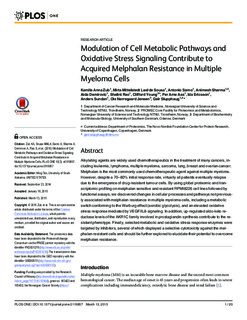Modulation of cell metabolic pathways and oxidative stress signaling contribute to acquired melphalan resistance in multiple myeloma cells.
Zub, Kamila Anna; Sousa, Mirta; Sarno, Antonio; Sharma, Animesh; Demirovic, Aida; Rao, Shalini; Young, Clifford; Aas, Per Arne; Ericsson, Ida; Sundan, Anders; Jensen, Ole Nørregaard; Slupphaug, Geir
Journal article, Peer reviewed

Åpne
Permanent lenke
http://hdl.handle.net/11250/298838Utgivelsesdato
2015Metadata
Vis full innførselSamlinger
Sammendrag
Alkylating agents are widely used chemotherapeutics in the treatment of many cancers, including leukemia, lymphoma, multiple myeloma, sarcoma, lung, breast and ovarian cancer. Melphalan is the most commonly used chemotherapeutic agent against multiple myeloma. However, despite a 70–80% initial response rate, virtually all patients eventually relapse due to the emergence of drug-resistant tumour cells. By using global proteomic and transcriptomic profiling on melphalan sensitive and resistant RPMI8226 cell lines followed by functional assays, we discovered changes in cellular processes and pathways not previously associated with melphalan resistance in multiple myeloma cells, including a metabolic switch conforming to the Warburg effect (aerobic glycolysis), and an elevated oxidative stress response mediated by VEGF/IL8-signaling. In addition, up-regulated aldo-keto reductase levels of the AKR1C family involved in prostaglandin synthesis contribute to the resistant phenotype. Finally, selected metabolic and oxidative stress response enzymes were targeted by inhibitors, several of which displayed a selective cytotoxicity against the melphalan-resistant cells and should be further explored to elucidate their potential to overcome melphalan resistance
Beskrivelse
- Published article (CC BY 4.0)
Utgiver
Public Library of ScienceTidsskrift
PLoS ONEOpphavsrett
© 2015 Zub et al.
Med mindre annet er angitt, så er denne innførselen lisensiert som This is an open access article distributed under the terms of the Creative Commons Attribution License, which permits unrestricted use, distribution, and reproduction in any medium, provided the original author and source are credited
